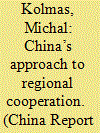| Srl | Item |
| 1 |
ID:
146895


|
|
|
|
|
| Summary/Abstract |
China’s rise has inspired a variety of interpretations arguing for either its potentially disruptive or alternatively its benign impact on Asia–Pacific security. This article aims to contribute to this debate. It focuses on the upsurge in Beijing’s multilateral diplomacy since the beginning of the 1990s, which has been reflected in China’s willingness to take part in many regional institutions, such as Shanghai Cooperation Organization (SCO), the Six Party Talks (6PT), East Asia Summit (EAS) or Asia Pacific Economic Cooperation (APEC). But what are China’s motivations for participation in these institutions? Are they instrumental, driven by pragmatic self-interest, or moral, driven by normative values of peace? Or, has China merely accepted the need to play a socially ‘appropriate’ role within the region? The article offers a theoretically informed typology of the different kinds of motivation that can explain China’s multilateral diplomacy in the last three decades. It argues that whereas social motivation played a decisive part in the first phase of China’s multilateralism, instrumental motivation can be seen as defining the more recent phase.
|
|
|
|
|
|
|
|
|
|
|
|
|
|
|
|
| 2 |
ID:
153242


|
|
|
|
|
| Summary/Abstract |
The aim of this article is to interpret Tokyo's pivotal role in the Kyoto Protocol negotiations as a practice of reconstructing Japan's identity of an ‘international’ and ‘independent’ country. The text bases this argument in poststructural national identity scholarship, which believes that discursive differentiation to international forces (‘others’) plays a decisive role in formulating state's identity. For most parts of the post-war history, United States served as the most significant other for Japan's self construction. Japan narrated itself as a ‘weak’ and ‘subservient’ country dominated by the ‘dominant’ West. This narrative, however, has been significantly altered after the dissolution of the Soviet Union. Japan's identity entrepreneurs began describing Japan as an ‘independent’ or ‘normal’ country, one that proactively contributes to world affairs. Tokyo's legitimization of the Kyoto Protocol was in line with this identity reconstruction. The image of a proactive environmental leader created a symbol of Kyoto that overshadowed the opponents of the Protocol, and lead Japan to ratify it albeit the United States chose to withdraw from it. Once the ratification was over, however, the practical implementation failed to comply with Japan's symbolic commitment.
|
|
|
|
|
|
|
|
|
|
|
|
|
|
|
|